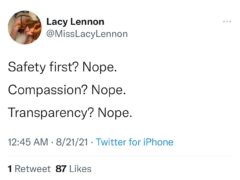from http://www.ynot.com/content/118859-porn-producers-running-places-shoot-socal.html
Porn Producers Running Out of Places to Shoot in SoCal
by Sue Denim
LOS ANGELES – With more counties, municipalities and potentially the state embracing legislation to control when, where and how adult content may be produced, it may not be long before the adult entertainment industry is squeezed out of southern California altogether.
In the most notorious example of paranoid nanny-ism to face California’s adult industry, Los Angeles County remains mired in a lawsuit challenging the constitutionality of an ordinance passed by voters last November. Colloquially known as Measure B, the ordinance requires adult studios to obtain special filming permits and mandates condoms, dental dams and other barrier protection be used in all sexually explicit productions. Last week, the court received a request for summary judgment from the plaintiffs and a motion to dismiss from an intervenor siding with the county, but the judge seems inclined to allow the case to proceed to a hearing scheduled to take place in early July.
Also last week, the City of Camarillo extended its moratorium on pornographic film permits through at least the end of 2013, and Ventura County approved a condom mandate and filming-permit measure. Simi Valley, which like Camarillo is located in Ventura County, passed an ordinance mandating condoms earlier this year.
Other SoCal governing bodies reportedly are considering similar moves. In many cases, politicians’ argument that condom mandates will protect the public from diseases rumored to be spread by porn stars ring hollow. In Ventura County, for example, the majority of public comments received while commissioners considered the new ordinance smacked more of “not in my backyard” conservative morality than genuine concern for anyone’s health.
Lest adult content producers think they might be able to relocate to the middle or northern sections of California, the state, too, has joined the legislative parade. Assembly Bill 332, sponsored by Assemblyman Isadore Hall III [D-Compton], essentially would expand Los Angeles County’s Measure B statewide. The bill passed the California State Assembly’s Labor and Employment Committee in April and now likely faces a May 24 hearing before the Appropriations Committee.
The adult entertainment industry has discussed packing up and heading en masse for friendlier climes, but even that may not prove to be a workable solution. AIDS Healthcare Foundation — the charitable organization that wrote, financed and shepherded the ballot initiative resulting in Measure B and now is backing AB 332 as well as bearing the majority of the ordinance’s legal defense — has threatened to take the condoms-in-porn crusade nationwide.
The adult industry “cannot just pick up their stakes and move to another state,” AHF President Michael Weinstein told The New York Times in January. “They’d hardly be welcomed in West Virginia or Utah or Mississippi, or even a place like Nevada, where legal prostitution is highly regulated and condoms are required. And we will follow them wherever they go.”











“And we will follow them wherever they go.”
Spoken like a true anti-sex, anti-First Amendment, corporate mouthpiece, who postures like Mussolini. Guys like this ALWAYS fall in some shocking scandal, and their hypocrisy is revealed. You just know his organization is stashing assets and dancing around the IRS with their nonprofit. I sincerely hope that he takes many along with him on the way down.
Porn will outlive this fool, as it has so many others before him.
And no new story emerges from this. Camarillo and Simi Valley had adopted local ordinances over nine months ago, and Ventura County was sure to follow. Statewide, AB332 has a long way to go and will face lengthy legal challenges if passed. For all the fanfare that AHF hypes over its “crusade,” there is STILL no established enforcement, or even agreed protocols, let alone budgets allocated to these new controls. Porn production is fairly strong right now, new talent continues to emerge every day, the mainstream is still knocking on the door, and the business has yet to topple. AHF sure ain’t no Meese Commission.
I love this story’s title too. Running out of places to shoot? There are a multitude of places to shoot in this state. Pretty much everywhere south, east, and north of L.A. county. We have a new mayor in San Diego, who is a liberal Dem, pro-labor, and keen to help boost the economy here and promote business growth. He’s even been trying to reopen medical cannabis dispensaries, which were shut down under the previous mayor. Dude seems like a porn fan. Just sayin.
The grass isn’t always greener on the other side. California is the only state with legalized pornography due to a state supreme court ruling (CA vs. Freeman) that was originally intended to destroy the industry; under the agreement that pandering does not apply to non-violent pornography so long as the actors aren’t being paid to gratify the one who’s handing over the cash.
Also worth mentioning is that the laws used to prosecute the (mob affiliated) financiers and theater managers for showing Deep Throat in something like 30 out of 40 states have not changed since the 1970’s. Harry Reems was charged with conspiracy and it took him years to dig himself out of that hole – only to be forgotten about by the cynical, self-destructive industry that it is.
So, wherever they end up: I wouldn’t get too comfortable.
From CNBC:
Chanel Preston knows not everyone approves of her chosen profession. That’s one of the risks that go with being one of the biggest stars in porn. But she never thought it would affect her ability to open a bank account.
Preston recently opened a business account with City National Bank in Los Angeles. When she went to deposit checks into the account days later, however, she was told it had been shut down, due to “compliance issues”.
She found the manager she had originally worked with and asked what had happened. The bank, she was told, was worried about the Webcam shows she had on her site and had revoked the account.
(City National declined to comment on Preston’s accusations and on whether it had any policy regarding accounts tied to the porn industry.)
Preston is hardly the only porn star who has had trouble with the banking industry. Several performers and porn insiders (who were afraid to go on the record due to possible repercussions from their banks) said they have been denied accounts from a variety of financial institutions.
“The people within my [local] bank have urged me to downplay the nature of my business because corporate frowns on it,” said one long-time industry veteran.
The issue seems to be reaching a boiling point, though. Earlier this week, Marc Greenberg, founder of the soft porn studio MRG Entertainment, filed suit against JPMorgan Chase in Los Angeles Superior Court, alleging the bank violated fair lending laws and its own policy for refusing to underwrite a loan for “moral reasons”.
Greenberg says he was approached by a representative of the bank about refinancing an existing loan. But once he started the process, he says he saw repeated delays for four months. That’s when he said he reached out to a JPMorgan vice president for an explanation.
The vice president “was evasive in his response to plaintiff’s application status requests and finally informed plaintiff during a telephone conversation that plaintiff’s loan application was refused due to ‘moral reasons,’ because of JPMorgan’s disapproval of plaintiff’s former source of income and occupation as an owner of a television production company that produced television programs that dealt with the subject of human sexuality,” the complaint reads.
Greenberg’s attorneys claim they were told by the vice president that the application was denied because of the potential “reputational risk” to the firm.
The rejection, noted the suit, was confounding since Chase had long held the original deed of trust on the home, without any comment on Greenberg’s career.
“JPMorgan purports to be so ashamed of nudity and human sexuality that it cannot process a refinance of a home loan of plaintiff, secured by plaintiff’s house, because plaintiff’s source of income six years ago included production of television programs that contained nudity and human sexuality,” the suit reads.
JPMorgan Chase declined to comment on the accusations due to the pending litigation.
Preston noted she, too, has been denied a loan because of her profession—though at a different bank.
“[The loan officer] asked me ‘are you affiliated with the adult entertainment industry?’ When I said yes, she said ‘We will not give you a loan.’,” she said.
Whether the decision to deny Preston’s business account or Greenberg’s refinance application is discriminatory lending is a matter of debate—and, in Greenberg’s case, something the courts will have to decide.
David Barr, a spokesperson for the FDIC, however, said institutions are permitted to make their own calls on who they work with to a certain degree.
“The decision to open or maintain an account is up to the individual institution,” he said. “The rules are not prescriptive, which means that the bank must make its own assessment to determine the risks associated with an account and whether that account should be terminated or not opened in the first place.”
And it is not uncommon for many businesses to take a moral stand about who they do business with. Indeed, some investment firms make it a point to avoid getting involved with tobacco producers or gun manufacturers because of the social issues tied to those industries.
Porn stars and adult entertainment industry insiders do note that the troubles they’ve experienced are tied to business—not personal—accounts. That may be because personal accounts are opened under their real names, which typically don’t raise an eyebrow, while business is done under more well-known pseudonyms, which is when people take notice.
“It’s kind of obvious about what I do when a young girl goes into a Valley bank with a different female name than the one on [their] driver’s license,” said Preston.
But such friction between people involved in the adult entertainment industry and banking institutions are likely to become more common. With the advent of the Internet, the $14 billion adult entertainment industry is undergoing a transformation. Film and video distribution is giving way to Internet sites and Web cams. As a result, barriers to entry in the industry are being lowered and more of the industry is being based out of homes and being run through small business arrangements and partnerships, necessitating banking services.